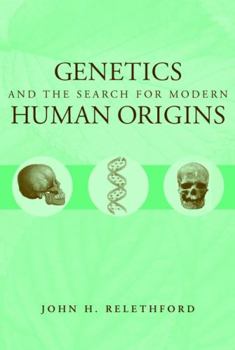Genetics and the Search for Modern Human Origins
A major debate in anthropology concerns the relationship betweenanatomically modern humans and earlier "archaic" humans includingthe Neandertals. What was the origin of modern humans? Did we ariseas a new species in Africa 200,000 years ago and then replacearchaic human populations outside of Africa, or are our originspart of a single evolving lineage extending back over the past twomillion years? In addition to fossil and archaeological evidence,...
Format:Hardcover
Language:English
ISBN:0471384135
ISBN13:9780471384137
Release Date:April 2001
Publisher:Wiley-Liss
Length:264 Pages
Weight:1.52 lbs.
Dimensions:0.7" x 7.2" x 10.3"
Customer Reviews
3 ratings
Within and Between: Evolution of the Study of Human Origins
Published by Thriftbooks.com User , 19 years ago
Coming from a perspective outside the field of biological anthropology I am always struck by a certain level of hesitation upon embarking on a document written by someone from within this technical field. While evolutionary theory is the main tenant of both this field as well as my field of study, evolutionary psychology, the approaches, suppositions, and terminologies are often perceived as being different and very distinctive. Likewise, the conflict within the field itself, the various approaches, and contrasting interpretations utilizing the same evidence can easily leave an outsider (not to mention insiders!) feeling overwhelmed and confused. After reading Relethford's Genetics and the Search for Modern Human Origins, some of this hesitation, and some of the seeming non-overlap between scientific groups, has been lifted. Relethford offers a clear, well-constructed argument on the modern human origins debate that has been volleyed back and forth between (and within!) the different areas of anthropology. He presents a basic background in the area of evolutionary theory, genetics, and the archeological evidence; an in-depth review of the various genetic studies and a strong argument for the application for the various computer-modeling techniques currently used. What is especially refreshing is that rather than relying on one technique (i.e. computer models or archeological evidence) and by not taking a definitive stance on one model alone to explain the time and place of human origins, he presents the perspectives of the central models of human evolution as a moderator, rather than a competitor. This manner allows the evidence itself to engage the reader into developing their own interpretation, rather than forcing them to accept the authors' own biases. The evidence presented throughout the book is used mainly to pit the African replacement model and the Multiregional evolution model against each other, in what Chamberlin (1897) called "the method of multiple working hypotheses" and Platt (1964) called "strong inference". By comparing the evidence to each model, rather than trying to fit it all within one chosen framework, Relethford arrives at the conclusion that modern humans arose from a "Mostly Out of Africa" scenario. This suggests that humans did indeed first arise in Africa, with subsequent evolutionary forces (mutation, natural selection, genetic drift, gene flow, and the interaction of) mediated by inter and intra-continental migrations, affecting their evolution both within this continent of origin and throughout the world. Overall, the genetic patterns elucidated by human DNA studies (mtDNA, Y-chromosome, and nuclear) suggest that Africa was the point of origin, with an initial migration toward the Middle East, branching off to Europe, Asia and Oceania, with a smaller (yet still substantial) return migration back home to Africa. Likewise, Relethford examines some of the controversy surrounding the placement of Neandertal's in r
Lucid and Engaging
Published by Thriftbooks.com User , 22 years ago
"Relethford writes...in a lucid and engaging manner. He dispassionately examines the major controversies surrounding modern human origins and clearly identifies the ways in which the genetic data impinge on the predictions of the explanatory models....[T]his book will appeal to the general science reader, as well as being suitable for upper-level undergraduate and graduate courses in Biological Anthropology." (American Journal of Human Biology)
.
Published by Thriftbooks.com User , 23 years ago
The modern human origins debate is finally illuminated with the first clear and understandable discussion of the genetic arguments on both sides. Relethford is a key player in this debate, and he brings to it a sorely needed perspective, placing the exciting laboratory results in the theoretical frame that explains them, and doing it in manner that the rest of us can grasp. It's good writing, because it's good thinking, and Relethford is to be congratulated for his efforts in clarifying and explaining the complex issues that underlie the conflict between Multiregional evolution and the Eve Theory. --Milford H. Wolpoff, Paleoanthropology Laboratory, University of Michigan






